English CBSE Class 12 NCERT Flamingo Chapter 6 Poets and Pancakes Free Solution of Extra Questions and Answers – Extract Based Questions Short Answer Questions Long Answer Questions and Value Based Questions
POETS AND PANCKAES
(Extra Questions)
Multiple Choice Questions
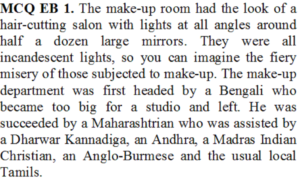

(i) According to the extract what looked like a hair cutting salon?
(a) studio
(b) make-up room
(c) both (a) and (b)
(d) neither (a) nor (b)
(ii) Why did people suffer misery in the make-up room?
(a) Because of mirrors
(b) Because of lights
(c) Because of head of the make-up department
(d) None of the above
(iii) Who became chief of make-up department after the first head left studio?
(a) a Dharwar Kannadiga
(b) an Anglo-Burmese
(c) a Maharashtrian
(d) a Madras Indian Christian
(iv) Which word in the extract is synonym to ‘helped’?
(a) subjected
(b) headed
(c) succeeded
(d) assisted
(v) According to the extract, the make-up department did not have representation for which of the state of India?
(a) Andhra
(b) Maharashtra
(c) Bengal
(d) Kerala
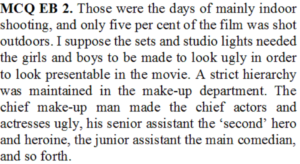

(i) What fraction of a movie used to be shot outdoors?
(a) Mainly outdoor shooting
(b) Complete movie
(c) Five percent
(d) None of above
(ii) ‘the girls and boys to be made to look ugly in order to look presentable in the movie.’ What is the literary device used in this part of the line?
(a) Simile
(b) Metaphor
(c) Paradox
(d) Hyperbole
(iii) The senior assistant did make-up of –
(a) Main actors
(b) Second heroine
(c) Main Comedian
(d) So forth
(iv) What was strictly maintained in the make-up department?
(a) lights
(b) mirrors
(c) heroines
(d) hierarchy
(v) The word ‘shooting’ as used in the extract would involve –
(a) use of a pistol
(b) use of a gun
(c) use of a camera
(d) any one of the above
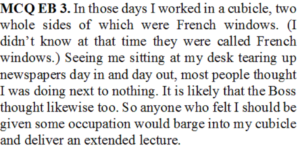

(i) During those days, the narrator used to occupy a –
(a) big cabin
(b) large office
(c) small cabin
(d) special office
(ii) Which of the following is implied by the phrase ‘tearing up newspapers’ as used in the extract?
(a) Converting a newspaper into small pieces
(b) Writing on a newspaper
(c) Reading a newspaper again and again
(d) Folding a newspaper again and again
(iii) A phrase ‘the Boss thought likewise too’ has been used in the extract. In your opinion what does it imply about thoughts of Boss?
(a) The narrator was liked by the Boss
(b) The narrator was without any work
(c) The narrator has a lot of work
(d) The narrator disliked the Boss
(iv) What does the word ‘occupation’ imply in the extract?
(a) profession
(b) possession
(c) work
(d) principle
(v) Who, according to passage, thought that the narrator was doing next to nothing?
(a) Narrator himself
(b) The Boss
(c) Most of the people
(d) Some of the people
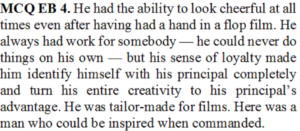

(i) ‘turn his entire creativity to his principal’s advantage’. In this sentence who do you think is indicated by the word ‘principal’?
(a) Subbu
(b) Office boy
(c) The employer
(d) The employee
(ii) Which of the following is not an attribute of ‘he’?
(a) Always look cheerful
(b) Always assigned work to others
(c) Never did anything on his own
(d) Always disloyal to his boss
(iii) ‘He was tailor-made for films.’ Which of the following is not the correct use of phrase ‘tailor-made’?
(a) This book is tailor-made for chefs
(b) This routine is tailor-made for improving timeliness
(c) This game is tailor-made for improving memory
(d) This house is tailor-made for shifting to another country
(iv) Which of the following word as used in the extract mean ‘ordered’?
(a) ability
(b) made
(c) inspired
(d) commanded
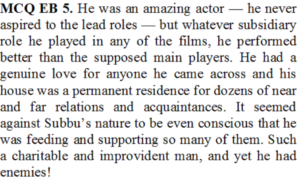

(i) Which of the following is not true about acting of Subbu?
1. He was a very good actor
2. He was an ambitious actor
3. His performance was better than those of many
4. He played subsidiary roles
5. He had a desire to play lead roles
(a) 1 and 2
(b) 3 and 4
(c) 4 and 5
(d) 2 and 5
(ii) Which of the following is not true about the people living in the house of Subbu?
(a) They were more than a dozen
(b) Some of them were his relatives
(c) Some of them were his enemies
(d) Some of them were his acquaintances
(iii) A word ‘charitable’ has been used in the extract. Which of the following word in not its synonym?
(a) generous
(b) philanthropic
(c) benevolent
(d) belligerent
(iv) What could have been the reason that Subbu had enemies?
(a) He was charitable
(b) He was improvident
(c) He was supportive to many
(d) None of the above
(v) Which of the following word as used in the extract means ‘aware of’?
(a) aspired
(b) genuine
(c) conscious
(d) supposed
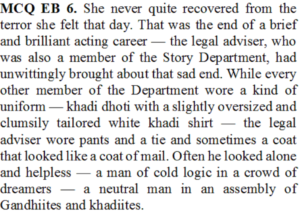

(i) Who has been referred to as ‘she’ in the above extract?
(a) An actress
(b) A lawyer
(c) A Painter
(d) A singer
(ii) The legal advisor was enrolled in which department?
(a) Legal Department
(b) Make-up Department
(c) Story Department
(d) Light and Sound Department
(iii) Which of the following was not worn by anybody of the Story Department?
1. Pant
2. Dhoti
3. Cap
4. White Shirt
5. Coat
6. Tie
(a) 1 only
(b) 2 only
(c) 3 only
(d) 4 only
(iv) Who had the privilege of not wearing uniform of Story Department?
(a) Actress
(b) Subbu
(c) Legal Advisor
(d) None of the above
(v) ‘Often he looked alone ..’ Which of the following cannot replace the word ‘often’ in this part of the sentence?
(a) usually
(b) most of the times
(c) rarely
(d) normally
(vi) Which of the following has not been an attribute of legal advisor?
1. Looked alone
2. A neutral man
3. He was a dreamer
4. A man of cold logic
5. Seemed helpful
(a) 1 and 2
(b) 2 and 3
(c) 3 and 4
(d) 3 and 5
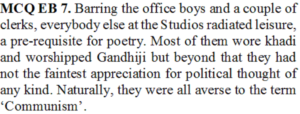

(i) For whom is the word ‘they’ used in above extract?
(a) Clerks
(b) Office boys
(c) Poets
(d) Gandhiji
(ii) Which word in the extract is synonymous to ‘except’?
(a) aversion
(b) couple
(c) barring
(d) faintest
(iii) Who among the following did not work leisurely?
(a) Poets
(b) Office boys
(c) Some of the clerks
(d) None of the above
(iv) Which of the following was not an attribute of ‘they’?
1. Wore khadi
2. Worshiped Gandhiji
3. Good awareness about political thoughts
4. Acted in movies
5. Disliked communism
(a) 1 and 2
(b) 3 and 4
(c) 4 and 5
(d) 2 and 4
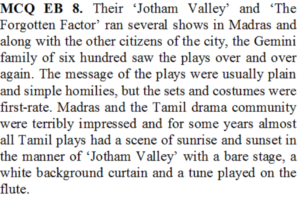

(i) What, in your opinion are ‘Jotham Valley’ and ‘The Forgotten Factor’?
(a) Name of movies
(b) Name of books
(c) Name of plays
(d) None of the above
(ii) Many years all Tamil plays had a scene of –
(a) sunrise
(b) sunset
(c) either (a) or (b)
(d) both (a) and (b)
(iii) According to the extract, what was the best about the plays?
1. messages
2. the people watching plays
3. sets
4. the people doing acting in plays
5. costumes
(a) 1 and 2
(b) 2 and 3
(c) 3 and 4
(d) 3 and 5
(iv) A phrase ‘over and over again’ has been used in the extract. Which of the following is not the correct use of this phrase?
(a) The child jumped over and over again
(b) The thief tried to break the lock over and over again
(c) This morning the Sun rose over and over again
(d) Last night clouds covered the moon over and over again
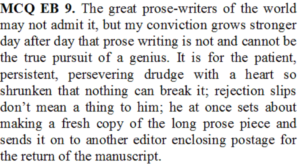

(i) According to the extract, who should not pursue prose writing –
(a) genius
(b) hard working person
(c) drudge
(d) impatient
(ii) Which of the following word is a one word for ‘hand written document’
(a) prose
(b) copy
(c) manuscript
(d) writing
(iii) Which of the following activities is not done by a persistent prose writer?
1. Making fresh copies of his prose
2. Feeling bad about rejection of prose
3. Sending his work to next editor
4. Attaching postage to help return of writing
4. Questioning the reason of return
(a) 2 and 4
(b) 1 and 2
(c) 2 and 3
(d) 2 and 5
(iv) Which of the following word as used in extract imply ‘belief’?
(a) persistent
(b) admit
(c) conviction
(d) shrunken
(v) Based on the extract, please choose correct option with respect to following statements?
Statement 1 – Narrator has a belief that genius should not try to become prose-writers.
Statement 2 – Being patient and persevering is a requirement of prose writers.
(a) Statement 1 is true but statement 2 is false
(b) Statement 1 is true and statement 2 is also true
(c) Statement 1 can be inferred but statement 2 cannot be inferred
(d) Both statement 1 and statement 2 can be inferred
Extract Based Questions


1. Write name of the city being referred to in above extract?
2. For what purpose the building of Gemini Studio earlier used?
3. Which word in the extract is antonym of ‘downstairs’?
4. How many other buildings Robert Clive had used in the city?


1. Please write full form of A.I.R.
2. Which department is being referred to in above extract’?
3. Which word in the extract mean ‘started’?
4. Why does author say that there was national integration in the department?
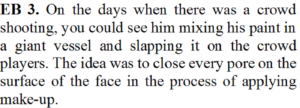

1. Who is referred to as ‘him’ in above extract?
2. Whom did ‘him’ consider his enemy?
3. How was make-up applied on crowd people?
4. Which word in the extract is antonym of ‘tiny’?


1. Who is referred as ‘he’ in above extract?
2. Which word in the extract is synonym of ‘organisations.?
3. In which department ‘he’ was enrolled?
4. What position ‘he’ commanded at the work place?


1. Who used to ask this question?
2. To whom would the question be asked?
3. How many ways used to be suggested for the shooting of this scene initially?
4. What does the word ‘cubs’ means?


1. What was the profession of ‘girl’?
2. Who recorded her voice when she got angry?
3. Which word in the extract is synonym of ‘rural area’?
4. Did the ‘girl’ continue to work afterwards?


1. Who is referred as ‘he’ in above extract?
2. Write name of ‘The Boss.
3. Was the film successful?
4. Which word in the extract is synonym of ‘make’?


1. Write name of the ‘visitor’.
2. The visitor was editor of which journal?
3. Was the visitor a poet indeed?
4. Which word in the extract is synonym of ‘rang’?
Short Answer Questions


Answer: During those days more than 95% part of a movie was shot indoors. Because of the use of sets and lights, make-up of every artist of the movie had to be done. Make-up had to done even for the people who played part of the crowd.
Therefore the make-up room was an important part in movie making.


Answer: Nobody was sure if the visitor was a poet. Name of the poet was not known. From speech of the owner of the studio, it became clear that he too did not know much about the poet. The speech of the poet was not understood by any of the listeners. They used to make Tamil films and had no interest in English poetry.
Hence the visit of the poet from England was termed a mystery.


Answer: MRA was an international group that used to stage plays. This group was a counter movement to international communism.
Mr. Vasan seems to have played in the hands of this group while giving permission to MRA to stage their plays.
The only impact of MRA was that the scenes of sunrise and sunset were copied by most of the theater companies.


Answer: Tamil was the mother tongue of most of the members of Gemini Studio. Owing to accent of the poet the speech was not understood by them.
The poet had also realised that his audience did not understand his speech about thrills and travails of an English poet.
Thus the author has described the whole event as incongruous.


Answer: Author was allotted a cubicle in the studio that had two large French windows. Author was seen reading newspapers during most part of the day. So everybody thought that he did not have any work to do.
Therefore everybody tried to give author a work whenever they could.


Answer: Office boy of the make-up department was responsible for doing make-up of crowd players. He thought himself to be a bit of poet too. Whenever he did not have any work, he would come to the cubicle of the author to enlighten the author about his literary talent. Author would get bored of such talks.
Therefore author wished that crowd shooting should continue for all the times.


Answer: Office boy considered that Subbu was neither more educated nor a better poet than he was. He also thought that Subbu was close to the boss.
Office boy believed that owing to these reason his own talents were not being recognized. He held Subbu responsible for his such plight.
Hence the office boy considered Subbu his enemy.


Answer: Subbu was a poet and an actor. He did every work to a great degree of excellence. He was highly creative person and could easily be inspired on command. Above all, he was easy go-getter, could get work done through any member of studio. He was loyal to the boss.
These attributes might have helped him to climb to number 2 position in Gemini Studio.


Answer: The first head of make-up department was from Bengal. Later a person from Maharashtra took his place. His team of assistants included people from Karnataka, Andhra, a Madras Indian Christian and an Anglo-Burmese Additionally he had local Tamils too to assist him.
Therefore the author had made a reference to national integration while describing make-up department.


Answer: The legal advisor was enrolled in the Story Department of Gemini Studio. When boss decided to close this department, along with poets and writers, legal advisor also lost his job.
Author points out that it was probably the only instance when a lawyer lost his job because of poets.


Answer: Subbu was a good poet and writer. He intentionally kept his writings closer to common people though he was capable of writing more complex and higher forms. He had composed several ‘story poems’ and written a sprawling novel also.
However, most people perceived that his success in films had dwarfed his literary achievements.


Answer: Audience could not understand accent, content and context of the speech. The poet could have spoken a bit slowly so that people could follow his accent. Also, he should have explained the context of his coming to Gemini Studio.
These two aspects would have helped people to appreciate content of his speech.
Long Answer Questions (120-150 words)


Answer: Subbu had a genuine love and respect towards anyone who came across. He had the ability to look cheerful even if he had contributed to film that eventually flopped at box office.
He was expert in getting any work done. He assigned the work to right person so that it was done in the best way.
He was loyal to his boss. He believed in directing all his abilities and wisdom to the advantage of his principal.
He could be inspired when commanded. If a producer asked about how to film a particular sequence, he would immediately come up with several suggestion. If these were not approved, he would soon make many more suggestions. He was the key person at Gemini Studio during its golden era.
He was content playing subsidiary roles in films though his acting was much better than those of leading artists.
Thus he was considered tailor made for film making.


Answer: The make-up department was constructed on upstairs of a building that was thought to be stable of Robert Clive. About half a dozen mirrors and several lights of incandescent type were installed. Hence department had look of a hair cutting saloon. Combined effect of mirrors and lights created a hot fiery misery for artists.
The first head of make-up department was from Bengal. Later a person from Maharashtra took his place. His assistants were from Karnataka, Andhra, a Madras Indian Christian, an Anglo-Burmese and many local Tamils. Author perceives this as a sign of national integration.
A strict hierarchy was maintained in the department. The chief did make-up of main artists, his senior assistant did for subsidiary artist, the junior assistant for main comedian. Crowd players were the responsibility of the office boy.
During those days major part of a movie was shot indoors. Thus make-up of every artist of the movie including those of crowd players had to be done.
Thus it can be visualied that make-up department was an important function of Gemini Studio.


Answer: Once an English poet had come to Gemini Studio. First, Mr. Vasan, the owner of the studio gave a speech. The audience could hardly make out anything about the poet. Later the poet gave a speech. Owing to accent of the poet, the speech was not understood by the audience. So the visit of the poet remained a mystery.
Sometime later, while reading a copy of ‘The Encounter’ in a library, author gathered that its editor was Stephen Spender.
Much later, wandering on a footpath, the author picked up a book ‘The God That Failed’. In this book, six eminent people had described their journeys with Communism. Stephen Spender was one of them. Now author was able to relate purpose of the visit of Stephen Spender.
Author understood that Stephen Spender had come to Gemini Studio to speak about communism. When this understanding dawned upon the author, he made the statement quoted in the question.


He exhibited compassion. He wanted to identify himself with masses rather than with elites. Please justify this quoting some instances from the text.
Answer: Subbu was an easy going person. He respected everyone with whom he came across. Many of his friends, relatives and acquaintances used to live with him at his house. He used to take good care of them and always respected them. The fact that he was feeding and supporting them had never gone into his head. He remained humble and compassionate.
Subbu was a good poet and writer. Subbu had composed several ‘story poems’ in folk style and in simple words of a common man. He had also written a long novel by the name of ‘Thillana Mohanambal’. He was certainly capable of writing more complex and higher forms of literature. But he intentionally opted to keep his poetry and writings close to masses.
Thus we can conclude that Subbu had lot of compassion in his heart and wanted to identify himself with masses.


Answer: In the lesson, Subbu has been describes as a person of various virtues. He is an easy go-getter, connected to general masses, humble, compassionate and loyal to his principal.
Among these traits I am of the opinion that humility is his best virtue.
He respected everyone with whom he came across. Many of his friends, relatives and acquaintances used to live with him at his house. He used to take good care of them and always respected them. The fact that he was feeding and supporting them had never gone into his head.
In such circumstances, it is easy for anyone to start feeling proud of oneself. But Subbu continued to remain humble. He derived pleasure in serving people without any selfish interest of his own.
It is said that ‘Without humility there can be no humanity’. To me being human is very important. Therefore humility is my most favourite trait.
****



0 Comments